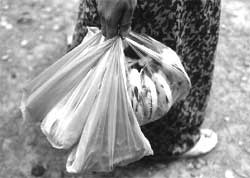Packaging plastic policy
 ban the plastic polybag and get rid of the plastic waste problem. Across the nation, there has been a public outcry for action. The media has dwelt on the issue ad nauseam . But the Union ministry of environment and forests ( mef ), instead of using this as an opportunity to formulate a basic policy for recycling and plastics waste management, has opted to pay lip-service by issuing a draft notification to deal with the tip of the iceberg - the polybag.
ban the plastic polybag and get rid of the plastic waste problem. Across the nation, there has been a public outcry for action. The media has dwelt on the issue ad nauseam . But the Union ministry of environment and forests ( mef ), instead of using this as an opportunity to formulate a basic policy for recycling and plastics waste management, has opted to pay lip-service by issuing a draft notification to deal with the tip of the iceberg - the polybag.
But will this rid us of plastics waste? Is it not time we examined the whole issue of packaging, plastics and recycling per se, rather than dismiss this critical area of waste management so summarily.The proposed notification entitled 'Recycled Plastic Usage Rules', tries to make everyone happy by not being too harsh on an industry that is crying for producer responsibility, and a comprehensive packaging policy that completely ignores the whole area of plastics recycling. By merely trying to curb the use of recycled polybags for food and making them a little thicker (25 micron) it ignores the larger responsibility. Visions of inspectors roaming the streets with micrometers looking for 25-micron thick bags are nightmarish. Is this one-page 'paper' regulation all we need to manage plastics waste when similar approaches worldwide run into volumes and encompass a variety of approaches?
Why is it so easily forgotten that almost all the plastics recycled in India takes place in the informal sector through the ragpicker? The picker collects what can be sold and this provides adequate income for a day's work. Carry bags take too long to collect for too little money - less than Rs 2 for 500 of them. But will making them marginally thicker give them a collection preference over, say, the more substantial mineral water bottles? Not very likely. Then do we not need to augment the collection system through a mix of fiscal and regulatory means? Other countries certainly think so.
An additional problem with recycled polybags is their toxicity. The bags can contain non-food-grade dyes with toxins like lead and cadmium. These, and other such chemicals, have a potential to leach out and contaminate food, especially fatty foods. The toxins can be harmful in very minute quantities and need to be kept out. But this problem can hardly be addressed in the informal sector, through mere legislation, when our environmental enforcement machinery is already overloaded. Also certain types of plastics such as polyvinyl chloride (pvc) are currently a subject of worldwide scrutiny with their potential to leach out toxic chemicals called pthalates. Recently, many large international toy manufacturers have removed items like pvc baby-teethers from their shop shelves owing to such concerns. Our rules do not even address this issue.
A constant lament is the lack of alternatives to polybags. It may be recalled that plastic bags, when introduced, had, in one fell swoop, removed competitors such as paperbags. This was not really driven by demand, but largely due to aggressive marketing by the plastics industry. There exists a latent demand for alternatives, but these need space to re-emerge and be made readily available. Many alternatives are equally, if not more, user-friendly and cheaper. However, there is no policy to either encourage or protect them.
Dealing with plastics waste, of which polybags are a part, should also include altering the existing structure of the recycling industry in India. Unsafe and unhealthy for the workers and polluting the environment, the recycling needs technology and money to improve the manufacturing process. A year-long study carried out by Srishti in a plastic recycling village in Delhi indicated considerably reduced lung functions of both the workers as well as the villagers, and residues of plastic scrap in the adjoining agricultural fields. Such areas exist all over the country and should be of great concern to policy-makers. The investments needed to restructure the existing recycling mechanism, need to be generated, including through producer responsibility.
The myopia of not treating recycling as a critical component of waste management completes the picture. No current waste policy initiative has examined the issue in its entirety. Both the recently formed Supreme Court committee on solid waste management as also the proposed draft notification of municipal waste being readied by the mef are examples of this.The critical concept of 'producer responsibility' has been ignored in all policy initiatives, showing the industry bias. The problem is going to escalate, as more than two million tonnes of plastic packaging waste will be produced by 2002, which is 50 per cent of the plastic production. And, then, not only will the country become a bigger waste dump but the polybag will have the last laugh.
The author is chief coordinator of the New Delhi-based non-governmental organisation Srishti
Related Content
- A solution package for plastic pollution: from measurement to action
- Unwrap our earth: public perspective and demand toward plastic pollution crisis in Indonesia
- The role of packaging regulations and standards in driving the circular economy
- The future of petrochemicals: towards more sustainable plastics and fertilisers
- Jute policy high on intent, low on implementation
- Ban and beyond
